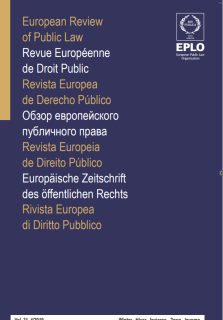
COVID-19, Legal Constraints, Questioning and Paradoxes within the EU: Some Reflections
Banque centrale du Luxembourg, Department of Financial Stability and Macroprudential Surveillance -
2, Bld Royal, L-2983, Luxembourg (email: christos.vassilopoulos@bcl.lu)
The economic crisis caused by sovereign debt in 2012 was a crisis that allowed the EU to redefine the conditions under which the EMU should perform. The economic crisis caused by COVID-19 is, on the other hand, a crisis that has highlighted the limits of the European project as a whole. It is the first time in the history of European construction that the principle of the free movement of persons has been affected in its human and economic substance. It is also the first time that the integration process now seems as fragile as the return of nationalism becomes inevitable. It is in this same unfortunate context that some national authorities are challenging the foundations of Union law, such as primacy. It is precisely in this same context that the ECB has shown realism in proposing measures to save the European project as a whole. This article sets out these observations of a European construction which is developing through its own paradoxes and which has to face not its “raison d’être” but a disease, COVID-19.
La crise économique provoquée par les dettes souveraines en 2012 est une crise qui a permis à l’UE de redéfinir les conditions dans lesquelles l’UEM devrait fonctionner. La crise économique provoquée par le COVID-19 est, en revanche, une crise qui a mis en évidence les limites du projet européen dans son ensemble. C’est la première fois dans l’histoire de la construction européenne que le principe de la libre circulation des personnes est affecté dans sa substance humaine et économique. C’est aussi la première fois que le processus d’intégration semble désormais aussi fragile que le retour du nationalisme devient inévitable. C’est dans ce même contexte regrettable que certaines autorités nationales remettent en cause les fondements du droit de l’Union, tels que la primauté. C’est précisément dans ce même contexte que la BCE a fait preuve de réalisme en proposant des mesures pour sauver le projet européen dans son ensemble. Cet article présente ces constats d’une construction européenne qui se développe à travers ses propres paradoxes et qui doit faire face non pas à “sa raison d’être” mais à une maladie, le COVID-19.
* This article should not be reported as representing the views of the BCL or the Eurosystem. The views expressed are those of the author and may not be shared by other staff members or policy makers in the BCL or the Eurosystem.





















